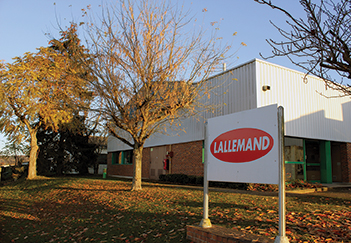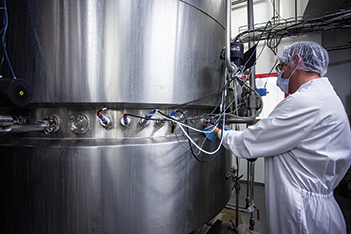 |
|||

|  |

|
|

Lallemand ingredient innovations protect cheese from contamination
Editor’s note: Welcome to Ingredient Innovation, CMN’s new segment exploring recent innovations and trends in the dairy ingredients sector. For this segment, we will profile a leader in the ingredients industry as well as share updates on mergers and acquisitions and new offerings for cheese and dairy in ingredients — where flavor begins.
|
Photo courtesy of Lallemand |
| SAFE SAMPLE — An operator takes a sample for analysis from a fermentation tank at Lallemand Specialty Cultures (LSC). LSC offers fermentation of customized microbial cultures for different applications in the cheese industry. |
 |
| Photo courtesy of Lallemand |
| GLOBAL NETWORK — With a global network of production plants, research laboratories, distribution centers and commercial offices in more than 50 countries across five continents, Lallemand is able to serve its customers worldwide and bring innovative products and solutions with the highest standards of quality, reliability and flexibility. |
By Alyssa Mitchell
MONTRÉAL — With more than 100 years of experience in dairy culture fermentation and a global network of facilities, Lallemand now is offering cheesemakers a new solution to protect against contamination in the production process.
Lallemand is a privately-held Canadian company that specializes in the development, production, and marketing of yeasts, bacteria and their derivatives. The company is organized into 11 technically-driven business units focused on various yeast and bacteria applications. Lallemand Specialty Cultures (LSC) is the business unit dedicated to specialty cultures for dairy, meat and plant-based applications.
The LSC unit has offices in Toulouse, and production centers in Aurillac and La Ferté-sous-Jouarre, France. Local representatives in the United States, Canada and Europe provide a global reach and give LSC the capability to serve customers worldwide. The LSC team includes food scientists, microbiologists and biochemists focused on helping clients obtain the right products and solutions for their needs, from bioprotection to surface and ripening cultures.
LSC also offers fermentation of customized microbial cultures for different applications and needs, and its facilities are cGMP- and FSSC 22000-certified. With leading process and technology capabilities, LSC works in cooperation with partners to deliver services ranging from R&D to production.
Julien Gadbin-Dherbécourt, who has a Ph.D. in Biochemistry/Microbiology of cheese and is the dairy culture and technology expert at LSC, notes that in the dairy and cheese industry, the rationalization of dairy cultures by major producers has significantly reduced product differentiation.
LSC offers cheesemakers the opportunity to cultivate unique strains at the highest standards of quality in order to produce signature products, he says.
“Our exclusive production capability, combined with customer expertise, creates highly sought-after differentiation. From flavor, color, texture and appearance to bioprotection, our cultures provide unique functionalities,” he adds.
Gadbin-Dherbécourt explains the origin of Listeria monocytogenes and the risk that this bacterium poses when present in dairy products, especially cheeses.
“Indeed, the contamination of cheeses by Listeria monocytogenes represents a major concern for the dairy industry, as it can lead to tremendous impacts from production losses to consumer food poisoning,” he says.
Listeria monocytogenes is a ubiquitous bacterium, which means that it is found in many environments, even difficult ones, with a strong capacity to persist and live, including in food, Gadbin-Dherbécourt adds.
He notes cheeses made from unpasteurized or raw milk are estimated to be 50 to 160 times more likely to cause Listeria monocytogenes infection compared to those made from pasteurized milk. Although pasteurization of milk kills the bacteria, products made from pasteurized milk still can be contaminated by cross-contamination from the production process (storage, transportation or handling) or the environment.
“Over the past 30 years, numerous university studies have shown that certain microorganisms naturally found in raw milk participate in the fermentative fight against Listeria monocytogenes in foodstuffs, especially cheese,” Gadbin-Dherbécourt says.
A patent filed by the University of Lorraine in France in 2021 highlights the particularly effective protective role of two new strains of Carnobacterium maltaromaticum isolated from raw milk in dairy technologies.
Thanks to a close relationship with this university, Lallemand Specialty Cultures is proud to present its new LALCULT Protect LC1, selected for its ability to act in cheese technology without modifying the organoleptic characteristics of cheeses, Gadbin-Dherbécourt says.
LALCULT Protect LC1 is composed of an exclusive strain of Carnobacterium maltaromaticum patented by the university. The strain was isolated from a raw milk collected in the Northeast region of France, Gadbin-Dherbécourt says. Tests performed at the French National Research Institute for Agriculture, Food and the Environment (INRAE) have confirmed the bioprotective effect of LALCULT Protect LC1 by drastically limiting the growth of Listeria monocytogenes concentration in different cheese products.
“LALCULT Protect LC1 is an innovative bioprotective solution on the market due to its exceptional activity and becomes a complementary tool for the cheesemaker in the control of Listeria monocytogenes contamination,” Gadbin-Dherbécourt says.
He notes the solution should be added to milk as early as possible in the process, possibly completed by spraying or smearing of the cheeses.
He adds LALCULT Protect LC1 is very easy to use due to its freeze-dried form that does not inhibit lactic cultures and has a limited contribution to the aromatic properties and acidification.
LALCULT Protect LC1 also has a large range of cheese applications including fresh cheeses, soft cheeses, semi-hard cheeses, blue cheeses and plant-based alternatives.
Lallemand also provides microbiological solutions for dozens of different industries from human, animal health and nutrition, to baking, winemaking, brewing, food ingredients, probiotics and biofuels.
With a global network of production plants, research laboratories, distribution centers and commercial offices in more than 50 countries across five continents, the company is able to serve its customers worldwide and bring innovative products and solutions with the highest standards of quality, reliability and flexibility.
Lallemand has a proprietary bank of yeast and bacteria that includes thousands of genetically-identified strains. With the goal of reproducing, managing and optimizing natural fermentation processes, Lallemand offers its customers not only the precise microorganism or derivative that fits their unique needs, but also the support, knowledge and expertise that comes with more than a century of continuous research in this field.
The company operates under four strategic pillars of its company philosophy:
• Determination, passion and enthusiasm;
• Audacity, decisiveness, and trial and error approach;
• Open culture, diversity and exchange of information because “nobody has a monopoly of good ideas;” and
• Never-ending search for better ways (quality, productivity and innovations).
“We are on a relentless search for a better way of doing things. We persistently explore ways to improve the quality of our products and processes, our productivity, and the innovations we offer our customers, partners, and the market,” Gadbin-Dherbécourt says.
He adds collaboration is at the heart of company operations, as much of Lallemand’s research and development is conducted through a combination of external partnerships and internal projects.
“At any given time, we are engaged in dozens of international collaborations — our initiatives range from fundamental research to more specific, applied development streams,” he says, noting some of the company’s key collaborators in Canada include Concordia University, McGill University and the research centers of Agriculture and Agri-Food Canada. Other significant partnerships outside of Canada include INRAE (National Research Institute for Agriculture, Food and Environment) in France and Versuchsanstalt der Hefeindustrie at the Berlin Technical University in Germany.
Lallemand also has many specialized laboratories around the world that aim to further develop applied product research and ensure the company delivers outstanding value to its customers and partners.
For more information, visit http://specialty-cultures.lallemand.com.
CMN
| CMN article search |
|
|
© 2025 Cheese Market News • Quarne Publishing, LLC • Legal Information • Online Privacy Policy • Terms and Conditions
Cheese Market News • Business/Advertising Office: P.O. Box 628254 • Middleton, WI 53562 • 608/831-6002
Cheese Market News • Editorial Office: 5315 Wall Street, Suite 100 • Madison, WI 53718 • 608/288-9090
